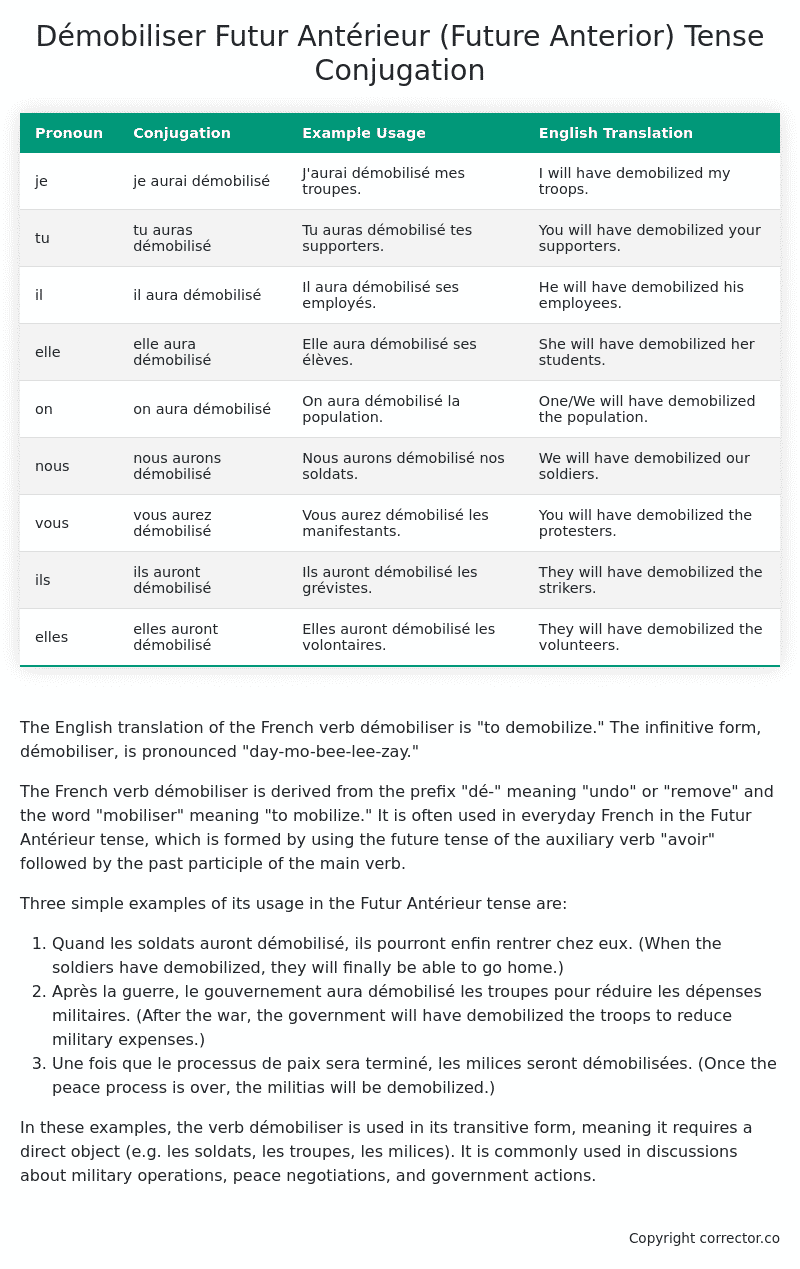Futur Antérieur (Future Anterior) Tense Conjugation of the French Verb démobiliser
Introduction to the verb démobiliser
The English translation of the French verb démobiliser is “to demobilize.” The infinitive form, démobiliser, is pronounced “day-mo-bee-lee-zay.”
The French verb démobiliser is derived from the prefix “dé-” meaning “undo” or “remove” and the word “mobiliser” meaning “to mobilize.” It is often used in everyday French in the Futur Antérieur tense, which is formed by using the future tense of the auxiliary verb “avoir” followed by the past participle of the main verb.
Three simple examples of its usage in the Futur Antérieur tense are:
- Quand les soldats auront démobilisé, ils pourront enfin rentrer chez eux. (When the soldiers have demobilized, they will finally be able to go home.)
- Après la guerre, le gouvernement aura démobilisé les troupes pour réduire les dépenses militaires. (After the war, the government will have demobilized the troops to reduce military expenses.)
- Une fois que le processus de paix sera terminé, les milices seront démobilisées. (Once the peace process is over, the militias will be demobilized.)
In these examples, the verb démobiliser is used in its transitive form, meaning it requires a direct object (e.g. les soldats, les troupes, les milices). It is commonly used in discussions about military operations, peace negotiations, and government actions.
Table of the Futur Antérieur (Future Anterior) Tense Conjugation of démobiliser
| Pronoun | Conjugation | Example Usage | English Translation |
|---|---|---|---|
| je | je aurai démobilisé | J’aurai démobilisé mes troupes. | I will have demobilized my troops. |
| tu | tu auras démobilisé | Tu auras démobilisé tes supporters. | You will have demobilized your supporters. |
| il | il aura démobilisé | Il aura démobilisé ses employés. | He will have demobilized his employees. |
| elle | elle aura démobilisé | Elle aura démobilisé ses élèves. | She will have demobilized her students. |
| on | on aura démobilisé | On aura démobilisé la population. | One/We will have demobilized the population. |
| nous | nous aurons démobilisé | Nous aurons démobilisé nos soldats. | We will have demobilized our soldiers. |
| vous | vous aurez démobilisé | Vous aurez démobilisé les manifestants. | You will have demobilized the protesters. |
| ils | ils auront démobilisé | Ils auront démobilisé les grévistes. | They will have demobilized the strikers. |
| elles | elles auront démobilisé | Elles auront démobilisé les volontaires. | They will have demobilized the volunteers. |
Other Conjugations for Démobiliser.
Le Present (Present Tense) Conjugation of the French Verb démobiliser
Imparfait (Imperfect) Tense Conjugation of the French Verb démobiliser
Passé Simple (Simple Past) Tense Conjugation of the French Verb démobiliser
Passé Composé (Present Perfect) Tense Conjugation of the French Verb démobiliser
Futur Simple (Simple Future) Tense Conjugation of the French Verb démobiliser
Futur Proche (Near Future) Tense Conjugation of the French Verb démobiliser
Plus-que-parfait (Pluperfect) Tense Conjugation of the French Verb démobiliser
Passé Antérieur (Past Anterior) Tense Conjugation of the French Verb démobiliser
Futur Antérieur (Future Anterior) Tense Conjugation of the French Verb démobiliser (this article)
Subjonctif Présent (Subjunctive Present) Tense Conjugation of the French Verb démobiliser
Subjonctif Passé (Subjunctive Past) Tense Conjugation of the French Verb démobiliser
Subjonctif Imparfait (Subjunctive Imperfect) Tense Conjugation of the French Verb démobiliser
Conditionnel Présent (Conditional Present) Tense Conjugation of the French Verb démobiliser
Conditionnel Passé (Conditional Past) Tense Conjugation of the French Verb démobiliser
L’impératif Présent (Imperative Present) Tense Conjugation of the French Verb démobiliser
L’infinitif Présent (Infinitive Present) Tense Conjugation of the French Verb démobiliser
Struggling with French verbs or the language in general? Why not use our free French Grammar Checker – no registration required!
Get a FREE Download Study Sheet of this Conjugation 🔥
Simply right click the image below, click “save image” and get your free reference for the démobiliser Futur Antérieur tense conjugation!

Démobiliser – About the French Futur Antérieur (Future Anterior) Tense
Construction
Common Everyday Usage Patterns
Interactions with Other Tenses
For example
Summary
I hope you enjoyed this article on the verb démobiliser. Still in a learning mood? Check out another TOTALLY random French verb conjugation!


